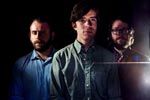| |
|
|
|
|
|
|
| |

$21.99 LP


$9.99 MP3


|
|
KEITH FULLERTON WHITMAN
Occlusions
(Editions Mego)
 Preview Songs on Other Music's Download Store Preview Songs on Other Music's Download Store
Keith Fullerton Whitman has had something of a second musical life. Known in the late '90s and early aughts as Hrvatski, he pursued a form of brutalist IDM, employing break beats and noise. Some called it drill'n'bass. Some called it splatter core. As he continued, his pursuits shifted, leaning toward a fascination with the 20th century avant-garde that links early musique concréte to Eliane Radigue and Tod Dockstader. His instrumentation changed from computers and samplers to an obsession with modular synthesizers. To boot, though his influence as a creator has been significant, his role with distributor Forced Exposure and now his own online shop Mimaroglu has been inestimable. Simply put, Whitman is a mainstay of the American avant-garde scene.
Occlusions, his second release for Editions Mego, is certainly more of a challenging record than either 2010's excellent Generator (Root Strata), 2005's equally excellent Multiples (Kranky), or 2002's drone-focused Playthroughs (Kranky). If it can be compared with anything in his recent past, it would be "High Zero Generator" from his first Editions Mego release, Generators, wherein Whitman takes us on an uneasy ride through the universe of modular synthesis. The album is made up of two live, improvised versions of "Occlusions" recorded within a week of one another, the first being "Occlusion (Rue de Bitche)" from February 18, 2012 at Les Ateliers De Bitche, in Nantes, France. When heard on headphones, one detects the crowd in attendance. This is not the silent audience of the 20th century avant-garde, however; the chatter that accompanies Whitman's bristling analog destruction seems decidedly 21st century. Why ponder the complexities of such challenging sound when you can have a beer and find out how your friend's romantic entanglement has been proceeding? But right before the four-minute mark, the chatter all but recedes. For a moment, you get the sense that Whitman is no longer antagonizing the crowd. He's earned their respect -- whether out of fear, or genuine fascination, one cannot say. Things even get tranquil before the sound approximates the squelching of Kubrick's HAL having a meltdown. When an audience member "woo-hoos" after a particularly intense episode, the thought crosses your mind that this is the analog-synth equivalent of Yngwie Malmsteen. It's not -- though Whitman does concede to the fact that he was "mildly inebriated" during this performance. Fourteen minutes in, things get, well, musical. For a minute or so, that is. Something approximating a sequence gurgles forth, like Basic Channel given an energy drink and remixed by Robert Hood and Moebius. "Gettin' there, gettin' there," you hear an American voice say; perhaps it's Whitman speaking. Out in the crowd, a man shrieks.
"Occlusion (Weteringschans)" was recorded a week later on February 25 in Amsterdam at Paradiso, and here Whitman is able to silence the crowd in just two minutes. Though not immediately apparent, here we find the artist as investigator of sound. The audience is rapt. Or confused. Or overwhelmed. They're silent in any case, but there is a focus that, even when things get aggressive, is decidedly distinct from the earlier version. Whitman says he was in "an arbitrarily triggered blind rage." Again, just after fourteen minutes, a transition teases you into thinking something resembling a traditional melody might enter the fray. Wrong. The low tones, ring modulation and tremolo continue to the end. Should these be considered purely improvisations or compositions? It's hard to say. It makes for engaging, challenging listening. Says Whitman: "It is not recommended to those seeking meter, melody, cleanliness, or a clearly outlined organizational sense." Certainly, if there's anything that might be the antithesis of easy listening, this is it. [AGe]
|
|
| |
|
|
|
|
|
|
|





















